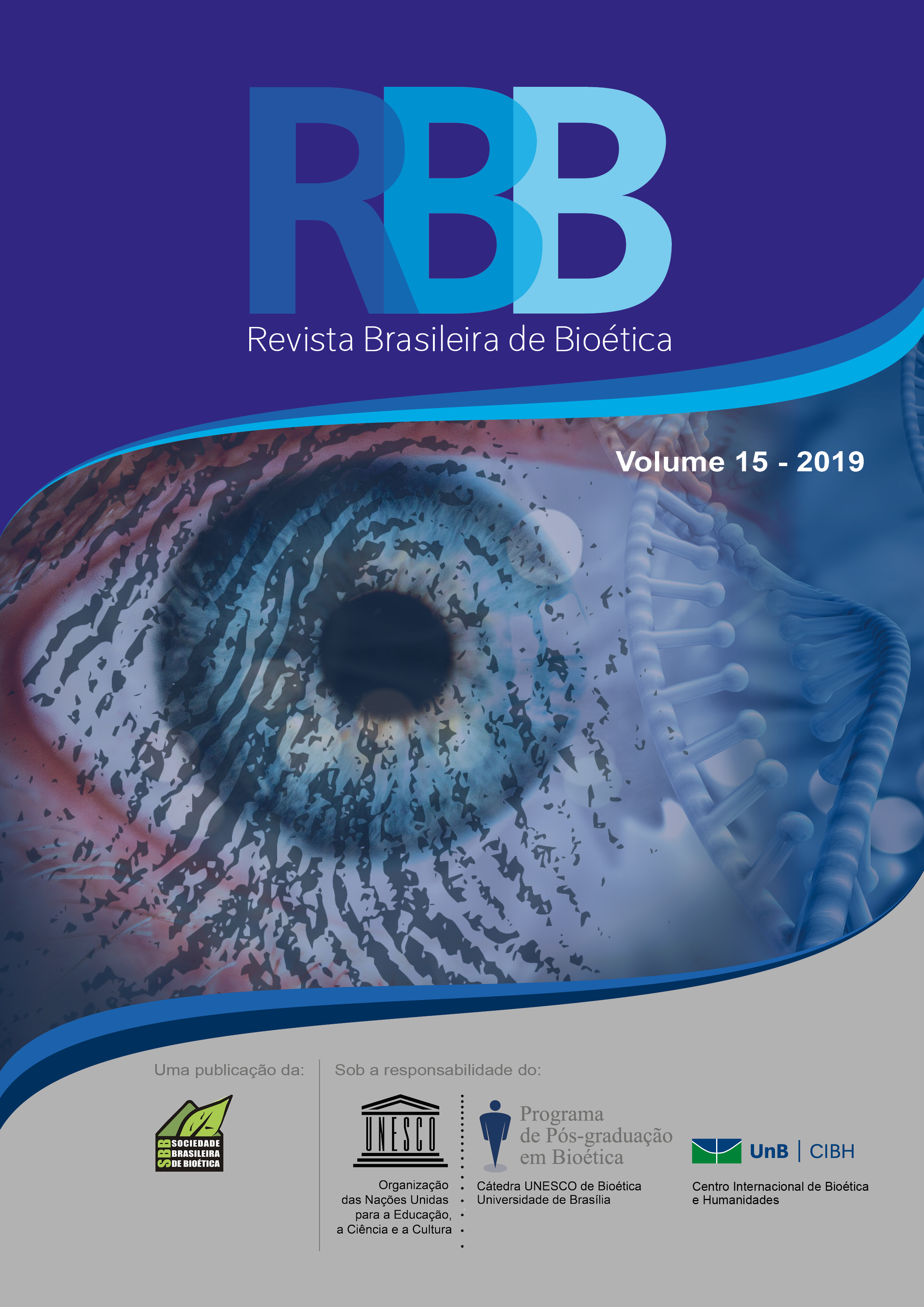Analysis of the teaching of death and dying in brazilian medical graduation
DOI:
https://doi.org/10.26512/rbb.v15.2019.23286Keywords:
Death, Universities, Brazil, Medical education, ThanatologyAbstract
In Brazil, conceptions about death have changed several times throughout history, including in what concerns the process of medical training. In the twentieth century, the institution of the biotechnic and hospital-centered medical model entailed a profound detachment from the category in relation to finitude, whose study is based on the phenomena of tanatology. The act of dying, which had previously been considered natural and had taken place in the home, has since taken place in hospital beds, and it is the duty of the physician to combat it at all costs. For the health professional, the quest for healing often outweighs that of caring, and when that first practice is no longer possible, the resulting frustration can lead to an intense physical and mental exhaustion known as Burnout syndrome. As for the patient, the consequences of this process may be even more onerous, especially as regards the prolongation of their pain and suffering. Based on these aspects, the objective of this research was to investigate the insertion of the study of death in the 50 best medical universities in the country, according to the ranking of Folha (RUF) published in 2017. It is, therefore, a study of a documental base of the qualitative-descriptive type, which made it possible to show a profound deficit regarding the students' qualification for the process of death and care for the dying patient.
References
ALMEIDA, Luana Ferreira De; FALCÃO, Eliane Brígida Morais. Representação Social de Morte e a Formação Médica: a Importância da UTI. Revista Brasileira de Educação Médica, Rio de Janeiro, v. 37, n. 2, p. 226-234, abr./jun. 2018.
AZEREDO, Nára Selaimen G.; ROCHA, Cristianne Famer; CARVALHO, Paulo Roberto Antonacci. O Enfrentamento da Morte e do Morrer na Formação de Acadêmicos de Medicina. Revista brasileira de educação médica, Rio de Janeiro, v. 35, n. 1, p. 37-43, jan./mar. 2011.
BIFULCO, Vera Anita; IOCHIDA, Lúcia Christina. A formação na graduação dos profissionais de saúde e a educação para o cuidado de pacientes fora de recursos terapêuticos de cura. Revista Brasileira de Educação Médica, Rio de Janeiro, v. 33, n. 1, p. 92-100, jan./mar. 2009.
COSTA, Iolanda Cristina Da; ROCHA, Ana Cristina D´Oliveira. Percepções da morte e do morrer para residentes de medicina em um hospital terciário. Revista Ciências em Saúde, Itajubá, v. 7, n. 4, p. 7-14, out./dez. 2017.
FIGUEIREDO, Maria Das Graças M. C. A.; STANO, Rita De Cássia M. T.. O Estudo da Morte e dos Cuidados Paliativos: Ausências no Currículo de Medicina. Revista Ciências em Saúde, Itajubá, v. 3, n. 3, p. 74-86, jul./set. 2013.
FIGUEIREDO, Maria Das Graças M. C. A.; STANO, Rita De Cássia M. T.. O Estudo da Morte e dos Cuidados Paliativos: uma Experiência Didática no Currículo de Medicina. Revista brasileira de educação médica, Rio de Janeiro, v. 37, n. 2, p. 298-307, abr./jun. 2013.
FILHO, Alberto Mesquita. Teoria sobre o método científico - em busca de um modelo unificante para as ciências e de um retorno à universidade criativa. 2006. 21f. Dissertação ”“ USTJ, São Paulo, 2006.
FOLHA DE SÃO PAULO. Ranking universitário folha 2017. Disponível em: <http://ruf.folha.uol.com.br/2017/ranking-de-cursos/medicina/>. Acesso em: 25 jan. 2018.
GARCIA, João B. Santos; RODRIGUES, Rayssa Fiterman; LIMA, Sara Fiterman. A estruturação de um serviço de cuidados paliativos no Brasil: relato de experiência. REVISTA BRASILEIRA DE ANESTESIOLOGIA, Rio de Janeiro, v. 64, n. 4, p. 286-291, jul./ago. 2014.
INCONTRI, Dora; SANTOS, Franklin Santana. As leis, a educação e a morte - uma proposta pedagógica de tanatologia no Brasil. International Studies on Law and Education, São Paulo, n. 9, p. 73-82, set./dez. 2011. Disponível em: <http://www.hottopos.com/isle9/73-82Dora.pdf>. Acesso em: 08 fev. 2018.
KÜBLER-ROSS, Elizabeth. Sobre a morte e o morrer. 8 ed. São Paulo: Martins Fontes, 1998.
MARSIGLIO, Carla Fabbrini. Ensino de cuidados paliativos na graduação do curso de medicina. 2011. 34 f. Trabalho de conclusão de curso ”“ Universidade Federal de Santa Catarina, Florianópolis, 2011.
MARTA, G. N. et al. O estudante de Medicina e o médico recém-formado frente à morte e ao morrer. REVISTA BRASILEIRA DE EDUCAÇÃO MÉDICA, Rio de Janeiro, v. 33, n. 3, p. 405-416, jul./set. 2009.
MELLO, Aline Andressa Martinez; SILVA, Lucia Cecilia Da. A Estranheza do Médico Frente à Morte: Lidando com a Angústia da Condição Humana. Revista da Abordagem Gestáltica, Goiânia, v. 18, n. 1, p. 52-60, jan./jun. 2012.
MORAIS, A. R. G. D. et al. A importância da formação paliativista no currículo médico brasileiro: quando o curar não é possível. REVISTA UNINGÁ, MARINGÁ, v. 46, n. 1, p. 22-28, out./dez. 2015.
NEVES, Nedy M. B. C.; SIQUEIRA, José E. De. A bioética no atual Código de Ética Médica. Revista Bioética, Brasília, v. 18, n. 2, p. 439-450, mai./ago. 2010.
PORTAL DO MEC. Diretrizes curriculares nacionais do curso de graduação em medicina. Disponível em: <http://portal.mec.gov.br/cne/arquivos/pdf/med.pdf>. Acesso em: 10 abr. 2018.
PORTAL MÉDICO. Resolução CFM nº 1.995/2012. Disponível em: <http://www.portalmedico.org.br/resolucoes/cfm/2012/1995_2012.pdf>. Acesso em: 11 abr. 2018.
PORTAL MÉDICO. Código de ética médica - resolução CFM n° 1931/09. Disponível em: <https://portal.cfm.org.br/images/stories/biblioteca/codigo%20de%20etica%20medica.pdf>. Acesso em: 13 abr. 2018.
SANTOS, Manoel Antônio Dos; AOKI, Fernanda Cristina De Oliveira Santos; OLIVEIRA-CARDOSO, Érika Arantes De. Significado da morte para médicos frente à situação de terminalidade de pacientes submetidos ao Transplante de Medula Óssea. Ciência e saúde coletiva, Rio de Janeiro, v. 18, n. 9, p. 2625-2634, set. 2013.
THE ECONOMIST INTELLIGENCE UNIT. The 2015 Quality of Death Index. Ranking palliative care across the world. London, 2015. 71p.
WORLD HEALTH ORGANIZATION: WHO. Global atlas of palliative care at the end of life. Disponível em: <https://www.who.int/nmh/Global_Atlas_of_Palliative_Care.pdf>. Acesso em: 19 abr. 2018.
Downloads
Published
Issue
Section
License
Copyright (c) 2019 Revista Brasileira de Bioética

This work is licensed under a Creative Commons Attribution-NonCommercial-ShareAlike 4.0 International License.



